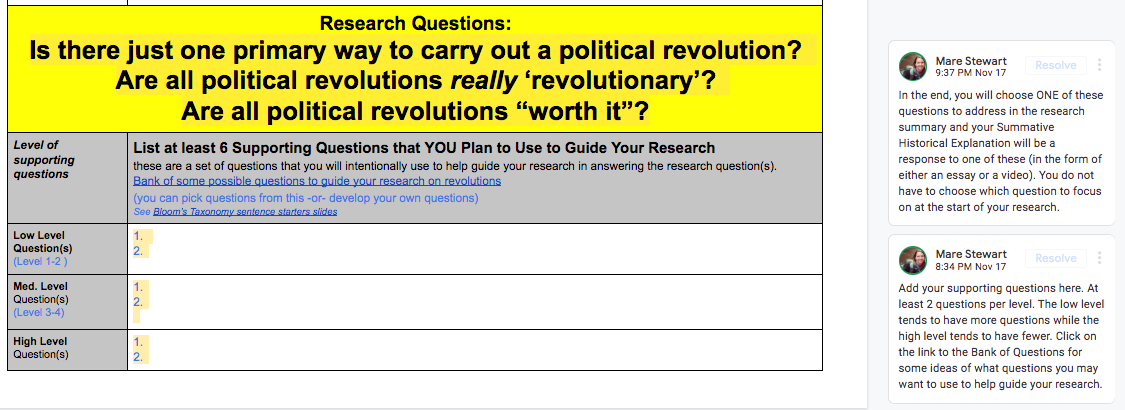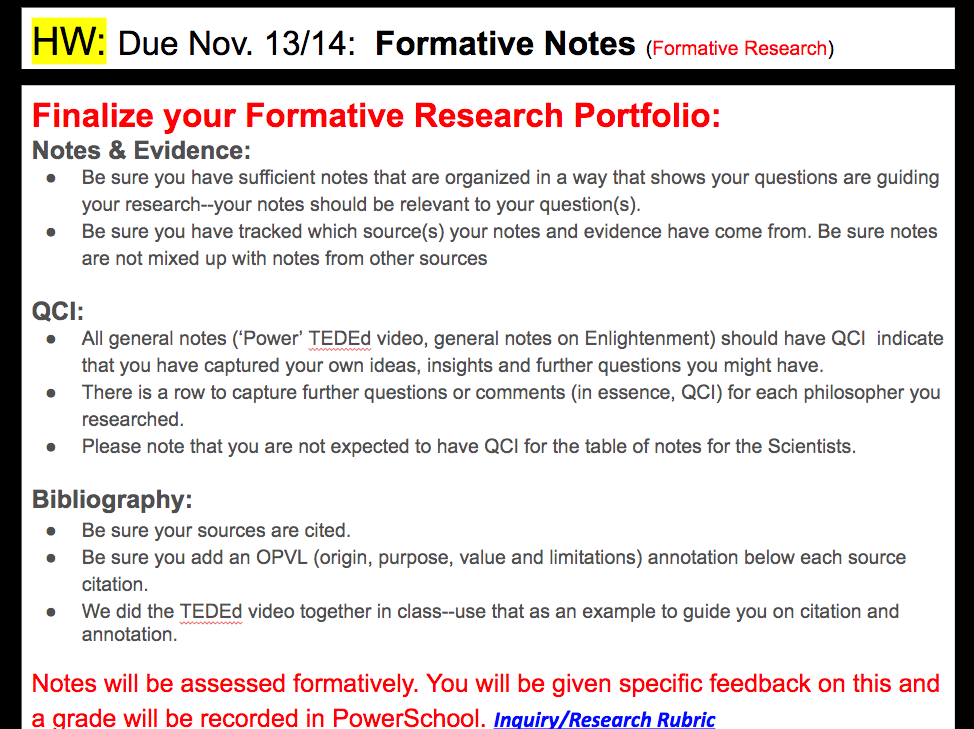|
Keep researching... You can use the sources provided and/or find sources on your own (the slide deck below for your revolution contains a list of sources for you to use)
HW: Keep researching & taking notes on 2nd revolutionYou can use the sources provided to you (see slide deck above).
Next class will be time spent working on the compare/contrast table and preparing for the Summative Socratic Discussion, so try to have all of your research notes for both revolutions completed by the time you come to the next class (A Blocks: Dec. 2; B Blocks, Dec. 3) You should have notes from 3 sources by the time you arrive to next class (Dec. 2/Dec. 3) TASK: After today's Quiz, take a look at the 6 other revolutions you can choose from (see Slideshow above & Presentations below):
Once you've decided on your 2nd revolution, please complete the following Google Form to indicate which one you've selected. How is studying historical revolutions relevant today?
HW: take notes from at least 1 source on 2nd revolution
Task #1: Develop your supporting questions for researchList at least 6 Supporting Questions that YOU Plan to Use to Guide Your Research these are a set of questions that you will intentionally use to help guide your research in answering the research question(s).
Task #2: Take Notes on French Revolution |
| | |
| | |
There are several factors that may lead to a revolution--rarely is there only 1 cause. Often there are underlying factors.
Consider the story of Alphonse the Camel -- was this not true for poor Alphonse's death? Revolutions are similar...it is not always caused by the final straw.
Let's take a look at a modern-day revolution to see how it began and what underlying factors may have been present that contributed to the start:
- Mohamed Bouazizi: The Spark that Ignited the Arab Spring (the globalist)
- The Arab Spring: A Year of Revolution (NPR)
Evo Morales and Bolivia (the Guardian, 18 Nov. 2019)
| | |
Read The Human Story, Chapter 13. Take notes on some of the revolutionary changes it addresses (hint: there are several revolutions mentioned in this chapter).
Use the guiding questions to decide what is worth taking notes on:
- WHAT IS A REVOLUTION?
- WHAT ARE SOME CAUSES OF REVOLUTIONS?
- WHAT ARE SOME EXAMPLES OF REVOLUTIONS IN HISTORY?
- WHAT ARE THE CONSEQUENCES (INTENDED & UNINTENDED) OF REVOLUTIONS?
You will be assessed using the following Shared Inquiry rubric:
HW: Finish Formative 'Age of Reason' Research Portfolio
- 'Power' (using TEDEd Video source)
- Compare/Contrast of Scientists (using Human Story Chapter 12 source)
- General notes on Enlightenment (using ABC-CLIO source)
- Compare/Contrast of your chosen philosophers: 1 group philosopher and 2 other philosophers chosen by you (sources used vary depending on philosopher)
Mrs. Stewart's Course
You'll find a daily agenda posted here for each day that class meets
Archives
May 2020
April 2020
March 2020
February 2020
January 2020
December 2019
November 2019
October 2019
September 2019
August 2019
May 2019
April 2019
March 2019
February 2019
January 2019
December 2018
November 2018
October 2018
September 2018
August 2018
May 2018
April 2018
March 2018
February 2018
January 2018
December 2017
November 2017
October 2017
September 2017
August 2017
May 2017
April 2017
March 2017
February 2017
January 2017
December 2016
November 2016
October 2016
September 2016
August 2016


 RSS Feed
RSS Feed